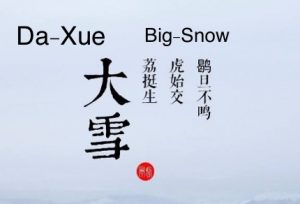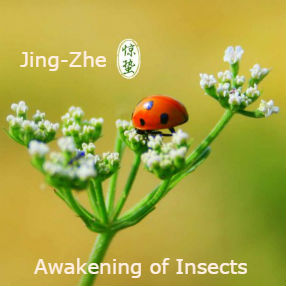
Da-Xue (noun)大雪 (Chinese): Big snow (21th solar term), literally in Chinese “da” 大 = big, “xue” 雪 = snow.
Example:
In the ancient Chinese calendar also known as the “agriculture calendar”, Da-Xue is one of the 24 solar terms which later spread to many Asian countries. The traditional Chinese lunisolar calendar divides a year into 24 solar terms. Da-Xue is the 21st solar term and 11th intercalating month (initial). Da-Xue begins when the Sun reaches the celestial longitude of 255° and ends when it reaches the longitude of 270°. Da-Xue often refers in particular to the day when the Sun is exactly at the celestial longitude of 270°. In the Gregorian calendar, Da-Xue usually begins around 7 December and ends around 21 December. The weather in Da-Xue is colder than that in Xiao-xue.
Ancient Chinese people thought that there are three climate periods during Da-Xue. In the first period, 鹖鴠不鸣 Chinese flying squirrels stopped screaming because of the cold weather; 虎始交 Tigers start to mate during the second period; 荔挺出 A kind of Chinese orchid “荔挺” (Li-ting) begins to sprout in the last period.
Since ancient times, Da-Xue has been a solar term for agricultural purposes in the lunar calendar. Da-Xue is still remembered and celebrated as a Chinese traditional festival.

